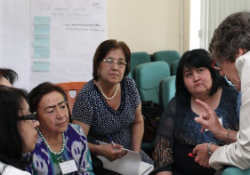Better Labs for Better Health update in Public Health Panorama

WHO
The Better Labs for Better Health (BLBH) initiative published an update of its activities in the second issue of Public Health Panorama, WHO/Europe's bilingual (English/Russian) journal.
The article "BLBH: intersectoral challenges and solutions for laboratory systems strengthening" analyses the 4 national laboratory policies prepared by the national laboratory working groups (NLWGs) in Kyrgyzstan, the Republic of Moldova, Tajikistan and Uzbekistan. NLWGs are intersectoral platforms recognized by ministries of health in which people work together to identify strengths and challenges, in order to determine how to make changes and improvements in laboratory systems at a national level.
Analysis of the national laboratory policies developed revealed cross-cutting challenges previously identified by others, e.g. human resources management, infrastructure, supply and maintenance of equipment and waste management, among others. Newly identified challenges were accessibility to services, financing and ethics. The policies acknowledged the opportunities for laboratory services development provided by investment in vertical programmes such as HIV, tuberculosis, malaria and influenza, which through training and implementation of quality management systems had raised awareness of laboratory quality.
Dr Caroline Brown, project lead for the BLBH initiative at WHO/Europe, says, "Bringing the different sectors together has enriched the content of the laboratory policies and forged relationships across institutes, which will continue to benefit laboratory services in the countries."
The article was written in cooperation with the national authorities of Kyrgyzstan, the Republic of Moldova, Tajikistan and Uzbekistan, as well as KIT (Royal Tropical Institute) Biomedical Research, the WHO Collaborating Centre for Laboratory Strengthening, the Netherlands.
Public Health Panorama provides a platform to scientists and public health practitioners for publication of lessons learned from the field, as well as original research work, to facilitate the use of evidence and good practice for public health action.



